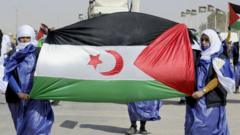Ernest Wilimowski's controversial dual allegiance raises questions about national identity in Silesia, as Poland grapples with the memories of World War II alongside modern nationalism in Europe.
The Complex Legacy of Ernest Wilimowski: Hero or Villain?

The Complex Legacy of Ernest Wilimowski: Hero or Villain?
The conflicting perceptions of a soccer star who represented both Poland and Nazi Germany reveal deeper issues of national identity and loyalty.
In the Polish region of Silesia, the legacy of Ernest Wilimowski, a former soccer star, is provoking intense debate regarding his dual representation of both Poland and Nazi Germany. As nationalism resurges across Europe, discussions surrounding his identity and actions challenge notions of loyalty and betrayal.
Wilimowski, celebrated for his remarkable performance on the pitch, notably scoring four goals for Poland against Brazil in the World Cup, found himself entangled in a web of conflicting national loyalties. He was a figure not just of Polish pride but also a representative for Nazi Germany during World War II, complicating the narrative surrounding his life and career. Alongside his ties to Poland and Germany, Wilimowski’s roots in Silesia—a culturally distinct area now part of Poland—add another layer to the discourse on national allegiance.
Experts like Zbigniew Rokita, a writer from Silesia, highlight the diverging perspectives on Wilimowski. While many Polish fans view him as a traitor who switched allegiances during a time of crisis, his family and community might assess his actions through a more nuanced lens, taking into account the complexities of identity in a region marked by historical conflict.
As the Polish soccer community continues to commemorate Wilimowski, contrasting opinions emerge. Some embrace his legacy as a goal-scoring legend, while others grapple with the implications of his wartime choices. The debate reflects broader themes of identity, loyalty, and historical memory in contemporary Poland, adding to the ongoing conversation about how nations remember and interpret the past amidst rising nationalistic sentiments.





















